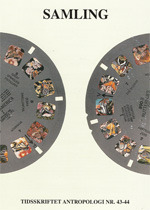SAMLING, SAMLERE OG JÆGER-SAMLERE: Primitiv erhvervskultur og civilisationens fix
DOI:
https://doi.org/10.7146/ta.v0i43-44.107411Resumé
Collecting is about taking possession of the
world, an exercise in how to make it one’s
own, says James Clifford. He refers to the
accumulation of material objects and to the
collecting of exotic, curious, rare things that
museum curators, philatelists, and art-lovers
dedicate themselves to. Collecting, however,
is not merely a pastime of an affluent elite.
Comparative hunter-gatherer studies indicate
that gathering serves to create an
existential space of freedom – even in contexts
where gathering appears primarily a
subsistence activity. Gathering puts time and
the social at play. It supports an escape from
the workings of time and from the bonds of
social relations and institutions that persist
through time mediated by exchanges of
objects. The article considers the trajectories
of hunter-gatherer research and some of its
results. It also points to its recent calling
into question some of the fundamental
assumptions on which the research has
been based. Hunter-gatherer society, after
all, may not be as distinct from other types
of society as previously believed. This
allows recognition that cultural phenomena
previously considered distinct features
of hunter-gatherer society figure equally
in other types of society. Indeed, features
known as “immediate return” or “demand
sharing” and even “living in the present”
may be adaptive forms of exchange and
perception constituted at the interface of
different – complex and less complex – types
of social systems. These features then, are
not special forms of exchange and ideology
characteristic of hunter-gatherers seen as a
model of pristine human life in groups. They
are social strategies that sustain the survival
of marginalized groups in contemporary
societies. Indeed, “living in the present” and
exchange in the form of “immediate return”
or “sharing” helps encapsulated systems
at the margins successfully escape total
incorporation into surrounding, dominant,
systems. A case in point is that of the Pajonal
Ashéninka in the Peruvian Amazon where
gathering is a necessary supplement to
horticulture while simultaneously being considered
a leisure activity by the Ashéninka
themselves. From the point of view of the
capitalist economy, this capacity of the
Ashéninka to sustain themselves “from
nothing” is an advantage in that it allows their
being hired by local settlers for contract labor
at very low costs to the employer. Gathering
in this context helps the Ashéninka remain
a relatively autonomous – and marginalized
– indigenous group. At the same time, their
availability as cheap reserve labor sustains
a marginal form of capitalist production, in
this case cattle-ranching in the rain forest,
that threatens and gradually appropriates the
resources on which the Ashéninka depend.
Marginalized groups, be they Amazonian
Indians, London prostitutes, Hungarian
Gypsies, or Aegean Greek peasants may
be shown to exhibit similar features of
orientation to the present, a quasi-ritual space
outside of durational time. They all appear to
take a “natural” abundance for granted and
to forage for their subsistence. They develop
modes of life oriented towards the present
and see no need to store for the future. In
this way the structural insecurity that is part
and parcel of their marginalized condition
is transformed into an active focus on a
celebration of immediate consumption in the
present. The marginalized may experience
themselves as free and autonomous people
to whom freedom from material possessions
and disengagement from institutions that
organize long-term social reproduction is
an existential choice. The marginalized
position, and the particular form of identity
it allows, however, is peculiarly vulnerable
to appropriation by others. Despite the
appearance of an autonomous way of life, it
is hardly an independent social phenomenon.
Rather, it is a product as much as the object of
a dual process of incorporation and marginalization.
In the end, the really interesting
question concerns the role of an orientation
towards the present tied to specific behavior
in any type of society in particular limited
contexts, be they gathering for subsistence,
shopping for fun, scavenging, collecting
beautiful art, or gathering rare sightings
of birds as a leisure time devotion. These
forms of behavior are rarely experienced
as economic activity. Rather they are seen
as forms of pleasure and fun, modes of
taking possession of the world. They signal
freedom of choice – yet, an imagined freedom.
“Gathering” in whatever form it
takes always involves substance, material
items, that subsequently will be arranged,
distributed or consumed. As an act of
dealing with something that endures beyond
its experience by the practitioner, gathering
is a good place to unite loose objects, ends,
perceptions and research interests.
Downloads
Publiceret
Citation/Eksport
Nummer
Sektion
Licens
Ophavsretten til artiklerne i Tidsskriftet Antropologi tilfalder forfatteren.
Artikler publiceret i Tidsskriftet Antropologi må citeres, downloades og videresendes for ikke-kommerciel brug, under forudsætning af normal akademisk reference til forfatter(e) samt tidsskrift, årgang, nummer og sider. Artiklerne må kun genudgives med eksplicit tilladelse fra forfatter(e) og tidsskriftet.


